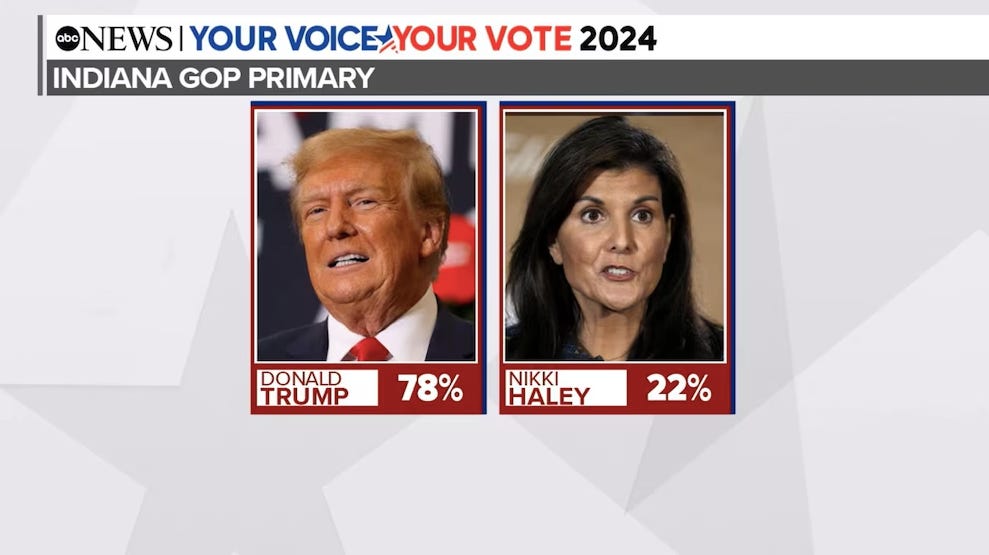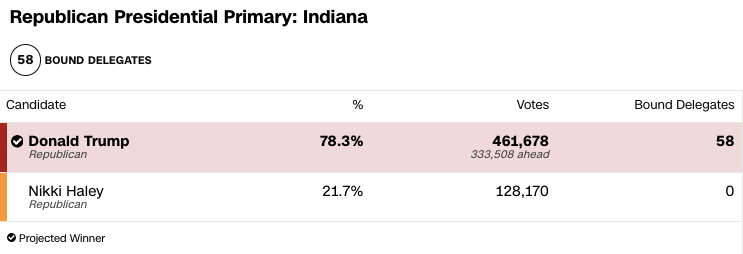Trump Is Still Losing 1/5 Of The Primary Vote To Nikki Haley 2 Months After She Dropped Out
This week, Nikki Haley won 21.7% of the Indiana Republican Primary vote despite dropping out of the race. This further proves Trump is a lot weaker within the GOP than he appears.
Thank you for reading! With media layoffs rattling the industry and the 2024 election looming, support for journalism has never been more crucial. If you value in-depth, honest analysis, consider becoming a free or paid subscriber to my newsletter. My content isn’t paywalled, but paid subscribers empower this work and gain access to exclusive community features. Your subscription makes a difference.
The dominant narrative has been that Donald Trump’s criminal trials would rally the Republican Party around him. Real-world elections have proven that argument wrong.
As Trump sat in a courtroom on Tuesday listening to Stormy Daniels testify, the adult film star who he paid hush money to, Indiana was running its Republican primary. While one would assume this primary would be an easy sweep for Trump, given there are no other candidates left in the race, it continued the trends of other Republican primaries before it, showcasing Trump’s general election weaknesses.
Nikki Haley, who dropped out of the presidential race a full two months ago, secured 128,170 votes, nearly 22% of the total roughly 590,000 votes cast in the deep-red state of Indiana’s Republican Primary.
In the suburban counties of Boone, Hamilton, and Marion in Indianapolis, Haley locked in over 30% of the vote. Haley’s overperformance in suburban counties put a spotlight on Trump’s weakness among moderate Republican and independent voters. The suburbs helped defeat Trump in the 2020 election and continue to prove a weak spot for him in 2024.
The Indiana results would be remarkable even if Haley was still in the race, but they’re even more important now, given these high numbers of voters are turning out to notch a protest vote against Trump and for a candidate who is no longer even in the race. But Indiana isn’t an anomaly. It comes amid a series of primaries where Haley has secured sizable percentages of the vote even after dropping out.
Haley’s 21.7% performance in Indiana is just the latest notable performance since she dropped out of the race. In primary after primary, Nikki Haley is still taking a chunk out of Trump’s vote share. In Washington’s Republican primary, Haley won 151,485 votes (19.1% of the vote). In Arizona, Haley won 110,966 votes (17.8%). In Pennsylvania, Haley won 157,974 votes (16.5%). In Georgia, Haley won 77,902 votes (13.2%). In Wisconsin, Haley won 76,762 votes (12.7%).
Haley garnered larger vote percentages in open primaries like in Indiana but still managed to pull remarkable numbers in closed primaries like Pennsylvania, where only registered Republicans were allowed to participate.
Trump’s weak showing is not the performance of a popular former president whose party is clamoring for his return to the Oval Office. For a former president who is essentially running as an incumbent, this is as weak as you can get. This is the performance of a deeply unpopular candidate, with around 1/5 of his own party showing up to vote against him for a candidate that has no shot at becoming the Republican nominee, let alone the next president.
Trump’s recent primary underperformance is a continuation of similar results we saw during the active primary elections. I covered those extensively. In almost every competitive primary this year where both Donald Trump and his rivals were on the ballot and actively competing for the nomination, Trump lost between 20-50% of the vote.
Why is that? When hearing directly from Nikki Haley voters and analyzing polling data, this is a vote taken based on principled opposition to Donald Trump and the kind of politics he embodies.
This week, the Biden Campaign released a video compilation of Nikki Haley voters vowing they won’t vote for Trump in the general election. This comes amid an avalanche of high-profile Republicans announcing they won’t vote for Trump. This week, former Lt. Governor of Georgia, Geoff Duncan, said he won’t vote for Trump, but he will vote for Biden. Former Speaker of the House Paul Ryan said he’s not voting for Trump and will instead write in a Republican.
While we’re hearing individual voices of Nikki Haley voters and some high-profile Republicans express opposition to Trump, the data collected in the context of these primary elections indicates it’s a wider phenomenon.
Exit polls in the Iowa, New Hampshire, South Carolina, North Carolina, and Virginia Republican primaries all found that over 20% of Republican primary voters would be dissatisfied if Trump won the nomination, 30% of Republican primary voters say Trump would be unfit for President if he’s convicted, and over 50% don’t identify with the MAGA movement.
Trump’s weakness with independents and moderates is glaring, the toxicity of the MAGA movement is apparent, and Trump’s corruption is a general election vulnerability.
Let’s dive deeper into this data.
The Exit Poll Data That Explains Trump’s Weak Primary Performances
Opposition To Trump Getting The GOP Nomination
In Virginia, 32% of Republican Primary voters, including 95% of Haley voters, said they’d be dissatisfied if Trump wins the nomination. In North Carolina, 20% of Republican Primary voters said the same, including 87% of Haley voters. In South Carolina, 31% of Republican primary voters, including 96% of Haley voters, echoed that same sentiment. In New Hampshire, we saw similar results, with 38% of Republican primary voters and 94% of Haley voters saying they’d be dissatisfied with a Trump nomination.
In a more stunning finding, CNN found that 81% of Haley voters in North Carolina on Super Tuesday said they would not vote for Trump in November. An NBC News/Des Moines Register poll echoed this finding, showing that 43% of Haley voters said they would back Biden in the general election.
Whether this will translate to Biden votes in November is yet to be seen. But if Donald Trump loses even a few percentage points of Republicans in key swing states like Michigan, Wisconsin, Pennsylvania, Arizona, and Georgia, he’s in real trouble. In battleground states, elections are won in the margins.
Trump’s Weakness With Independents And Moderate Republicans
While Trump won 74% of New Hampshire Republican primary voters, Haley still managed to get 25%. With Independents, who were 44% of New Hampshire primary voters, the results were flipped. Haley won 58% of Independents, and Trump won only 39%. In South Carolina, Nikki Haley won 62% of Independents and 30% of Republicans.
We saw this same phenomenon play out in every primary. This explains the suburban underperformance of Trump. Trump can’t win the election churning Independents at this level.
The MAGA Movement Is Toxic
57% of Virginia Republican primary voters, 52% of North Carolina Republican primary voters, 54% of South Carolina Republican primary voters, 63% of New Hampshire primary voters, and 50% of Iowa Cacugoers aid they don’t identify as part of the MAGA movement. About half of Iowa Republican caucusgoers, which is a very conservative and evangelical electorate, also said they don’t identify with the movement.
MAGA (“Make America Great Again”) is literally Trump’s campaign slogan and the core of his appeal. President Biden’s efforts to accurately depict the MAGA movement as extreme have likely made people less willing to publicly identify with it.
Trump’s Corruption Is Unpopular
Here’s where we see the price of Trump’s corruption.
37% of Virginia GOP primary voters, 30% of North Carolina GOP primary voters, 36% of South Carolina GOP primary voters, 42% of New Hampshire GOP primary voters, and 31% of Iowa GOP caucus voters said Trump wouldn’t be fit to serve as President if he’s convicted of a crime.
Interestingly, those views on a Trump conviction almost precisely correlate with Republican primary voter views on whether Biden won the 2020 election legitimately.
41% of Virginia GOP primary voters, 31% of North Carolina GOP primary voters, 36% of South Carolina GOP primary voters, 46% of New Hampshire GOP primary voters, and 29% of Iowa GOP caucus voters said Biden won the 2020 election legitimately.
Can Biden Exploit This Weakness?
The answer is yes. President Biden can take advantage of Donald Trump’s vulnerabilities, and his campaign is already trying to target Haley voters.
I wrote a Super Tuesday article on exactly how Biden can target Trump’s weaknesses. You can revisit that article below. It contains some of the same exit poll data I used in this article, but it goes further and breaks down exactly what angles Biden can attack Trump from.
Whether these vulnerabilities will persist in the general election is unclear. But one thing is for certain: Donald Trump is a lot weaker within the Republican Party than it appears.





